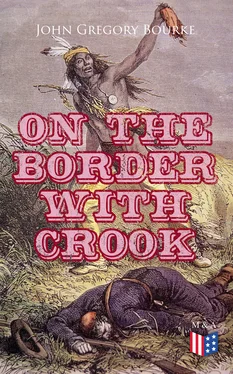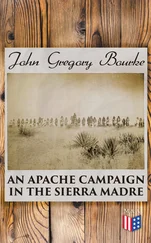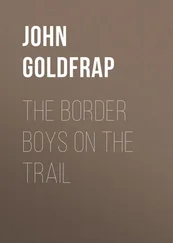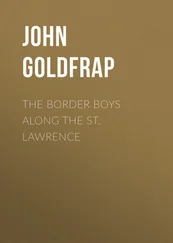He was allowed to select one of his many horses, and to take a pair of saddle-bags filled with such clothing and food as he could get together on short notice, and then, with a rifle and twenty rounds of ammunition, was led outside the lines and started for the Rio Grande. How he ever made his way across those two hundred and fifty miles of desert and mountains which intervened between the town of Tucson and the Union outposts nearer to the Rio Grande, I do not know—nobody knows. The country was infested by the Apaches, and no one of those upon whom he turned his back expected to hear of his getting through alive. But he did succeed, and here he is, a proof of devotion to the cause of the nation for which it would be hard to find a parallel. When the Union troops reoccupied Tucson Don Estevan resumed business and was soon wealthy again, in spite of the tribute levied by the raiding Apaches, who once ran off every head of draught oxen the firm of Tully, Ochoa & De Long possessed, and never stopped until they had crossed the Rio Salado, or Salt River, where they killed and “jerked” the meat on the slope of that high mesa which to this day bears the name of “Jerked Beef Butte.”
Another important factor in the formative period of Arizona’s growth is this figure walking briskly by, clad in the cassock of an ecclesiastic. It is Bishop Salpointe, a man of learning, great administrative capacity, and devoted to the interests of his people. He preaches little, but practises much. In many ways unknown to his flock he is busy with plans for their spiritual and worldly advancement, and the work he accomplishes in establishing schools, both in Tucson and in the Papago village of San Xavier, is something which should not soon be forgotten by the people benefited. He is very poor. All that one can see in his house is a crucifix and a volume of precious manuscript notes upon the Apaches and Papagoes. He seems to be always cheerful. His poverty he freely shares with his flock, and I have often thought that if he ever had any wealth he would share that too.
This one whom we meet upon the street as we leave to visit one of the gambling saloons is Pete Kitchen. We shall be in luck if he invite us to visit him at his “ranch,” which has all the airs of a feudal castle in the days of chivalry. Peter Kitchen has probably had more contests with Indians than any other settler in America. He comes from the same stock which sent out from the lovely vales and swales in the Tennessee Mountains the contingent of riflemen who were to cut such a conspicuous figure at the battle of New Orleans, and Peter finds just as steady employment for his trusty rifle as ever was essential in the Delta.
Approaching Pete Kitchen’s ranch, one finds himself in a fertile valley, with a small hillock near one extremity. Upon the summit of this has been built the house from which no effort of the Apaches has ever succeeded in driving our friend. There is a sentinel posted on the roof, there is another out in the “cienaga” with the stock, and the men ploughing in the bottom are obliged to carry rifles, cocked and loaded, swung to the plough handle. Every man and boy is armed with one or two revolvers on hip. There are revolvers and rifles and shotguns along the walls and in every corner. Everything speaks of a land of warfare and bloodshed. The title of “Dark and Bloody Ground” never fairly belonged to Kentucky. Kentucky never was anything except a Sunday-school convention in comparison with Arizona, every mile of whose surface could tell its tale of horror were the stones and gravel, the sage-brush and mescal, the mesquite and the yucca, only endowed with speech for one brief hour.
Within the hospitable walls of the Kitchen home the traveller was made to feel perfectly at ease. If food were not already on the fire, some of the women set about the preparation of the savory and spicy stews for which the Mexicans are deservedly famous, and others kneaded the dough and patted into shape the paper-like tortillas with which to eat the juicy frijoles or dip up the tempting chile colorado. There were women carding, spinning, sewing—doing the thousand and one duties of domestic life in a great ranch, which had its own blacksmith, saddler, and wagonmaker, and all other officials needed to keep the machinery running smoothly.
Between Pete Kitchen and the Apaches a ceaseless war was waged, with the advantages not all on the side of Kitchen. His employees were killed and wounded, his stock driven away, his pigs filled with arrows, making the suffering quadrupeds look like perambulating pin-cushions—everything that could be thought of to drive him away; but there he stayed, unconquered and unconquerable.
Men like Estevan Ochoa and Pete Kitchen merit a volume by themselves. Arizona and New Mexico were full of such people, not all as determined and resolute as Pete; not all, nor nearly all, so patriotic and self-denying as Don Estevan, but all with histories full of romance and excitement. Few of them yet remain, and their deeds of heroism will soon be forgotten, or, worse luck yet, some of the people who never dreamed of going down there until they could do so in a Pullman car will be setting themselves up as heroes, and having their puny biographies written for the benefit of the coming generations.
Strangest recollection of all that I have of those persons is the quietness of their manner and the low tone in which they usually spoke to their neighbors. They were quiet in dress, in speech, and in conduct—a marked difference from the more thoroughly dramatized border characters of later days.
Table of Contents
THE DIVERSIONS OF TUCSON—THE GAMBLING SALOONS—BOB CRANDALL AND HIS DIAMOND—“SLAP-JACK BILLY”—TIGHT-ROPE WALKERS—THE THEATRE—THE DUEÑAS—BAILES—THE NEWSPAPERS—STAGE-DRIVERS.
IT has been shown that Tucson had no hotels. She did not need any at the time of which I am writing, as her floating population found all the ease and comfort it desired in the flare and glare of the gambling hells, which were bright with the lustre of smoking oil lamps and gay with the varicolored raiment of moving crowds, and the music of harp and Pan’s pipes. In them could be found nearly every man in the town at some hour of the day or night, and many used them as the Romans did their “Thermae”—as a place of residence.
All nationalities, all races were represented, and nearly all conditions of life. There were cadaverous-faced Americans, and Americans whose faces were plump; men in shirt sleeves, and men who wore their coats as they would have done in other places; there were Mexicans wrapped in the red, yellow, and black striped cheap “scrapes,” smoking the inevitable cigarrito, made on the spot by rolling a pinch of tobacco in a piece of corn shuck; and there were other Mexicans more thoroughly Americanized, who were clad in the garb of the people of the North. Of Chinese and negroes there were only a few—they had not yet made acquaintance to any extent with that section of our country; but their place was occupied by civilized Indians, Opatas, Yaquis, and others, who had come up with “bull” teams and pack trains from Sonora. The best of order prevailed, there being no noise save the hum of conversation or the click of the chips on the different tables. Tobacco smoke ascended from cigarritos, pipes, and the vilest of cigars, filling all the rooms with the foulest of odors. The bright light from the lamps did not equal the steely glint in the eyes of the “bankers,” who ceaselessly and imperturbably dealt out the cards from faro boxes, or set in motion the balls in roulette.
There used to be in great favor among the Mexicans, and the Americans, too, for that matter, a modification of roulette called “chusas,” which never failed to draw a cluster of earnest players, who would remain by the tables until the first suggestion of daylight. High above the squeak of Pan’s pipes or the plinkety-plink-plunk of the harps sounded the voice of the “banker:” “Make yer little bets, gents; make yer little bets; all’s set, the game ’s made, ’n’ th’ ball’s a-rollin’.” Blue chips, red chips, white chips would be stacked high upon cards or numbers, as the case might be, but all eventually seemed to gravitate into the maw of the bank, and when, for any reason, the “game” flagged in energy, there would be a tap upon the bell by the dealer’s side, and “drinks all round” be ordered at the expense of the house.
Читать дальше












